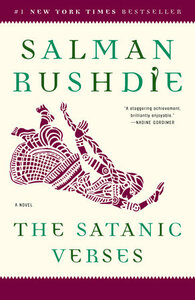Take a photo of a barcode or cover
An enjoyable read, there are some (Many!) skippable paragraphs & pages but overall I'm satisfied with this ಕಬ್ಬಿಣದ ಕಡಲೆ :)
adventurous
challenging
dark
mysterious
reflective
slow-paced
Plot or Character Driven:
Plot
Strong character development:
Complicated
Loveable characters:
Complicated
Diverse cast of characters:
Yes
Flaws of characters a main focus:
Yes
lighthearted
reflective
slow-paced
Strong character development:
No
Loveable characters:
No
Flaws of characters a main focus:
Complicated
I read this following the recent attack on Rushdie because of the obvious. It's an immense book. Dense, bewildering, overwhelming, I found myself zoning in and out, adrift on the tide, eventually letting the book wash over me, accepting I had little understanding of what was actually going on. Magical realism is not my cup of tea and it plays too close to that for my liking. There's no doubt it's a well written work by someone from a far greater intellectual vantage point than I.
I will heartily commend the narration by Sagar Arya - vivid and expressive, bringing real warmth and soul to the characters.
So. Not for me but I'm glad I read it. I hope Salman recovers.
I will heartily commend the narration by Sagar Arya - vivid and expressive, bringing real warmth and soul to the characters.
So. Not for me but I'm glad I read it. I hope Salman recovers.
I read this following the recent attack on Rushdie because of the obvious. It's an immense book. Dense, bewildering, overwhelming, I found myself zoning in and out, adrift on the tide, eventually letting the book wash over me, accepting I had little understanding of what was actually going on. Magical realism is not my cup of tea and it plays too close to that for my liking. There's no doubt it's a well written work by someone from a far greater intellectual vantage point than I.
I will heartily commend the narration by Sagar Arya - vivid and expressive, bringing real warmth and soul to the characters.
So. Not for me but I'm glad I read it. I hope Salman recovers.
I will heartily commend the narration by Sagar Arya - vivid and expressive, bringing real warmth and soul to the characters.
So. Not for me but I'm glad I read it. I hope Salman recovers.
Some authors are accused of flowery language, and while Salman Rushdie is certainly verbose, I can't call it all flowers. I felt as though I was in a thick jungle of tangential metaphors, allusions, and all the various figurative tools. It wasn't always pleasant. Bugs were buzzing around my ears, low branches smacked and scratched my face, and I was sweating profusely. But occasionally I'd catch glimpse of all the annoying pieces and find it quite attractive.
The book has a main story-line with two central characters. Rushdie's writing style was, as mentioned above, busy and exhausting. However! There are large portions of the novel telling the story of the pilgrims or of the Prophet Mohammad. Oddly, his writing style shifts for these alternate stories to a more direct, plot driven narrative. It was these portions of the novel that I could not put down and enjoyed the most. I loved reading about the Prophet, Baal, and Hind. I could read a whole book written like that. The main story though seemed to often get lost in its dizzying bouts of wordplay.
Thematically, the book is truly about two Indian men - each including all the baggage that comes along with centuries of Hinduism, caste, Islam, and British rule - who have a different approach to reconciling their nature to the West and to the UK in particular.
Saladin Chamcha takes on the devil's horns and hooves. As the Asian people in London begin to adopt the horns of the devil as their symbol, this embodiment of their displeasure with the racism and history of England, Saladin Chamcha resists. He actively wants to be more English and doesn't want to be this icon. Maybe it is his yearning desire to rid himself of his Indian culture that makes him into the horned scapegoat of the movement, evil in the eyes of his people for the way he views his own people. Either way, in the end, it is an unbridled hatred in his heart for Gibreel that returns him to his human state, begging the question: is true evil something uniquely human? Is the devil a mascot imitating what only humans are capable of?
Gibreel Farishta becomes the Archangel Gabriel. Gibreel's constant detours into the past, back to the Prophet or the pilgrims, are unclear to me in their purpose. I loved looking into the past and reading these stories, but I struggled to connect them to the larger narrative. I understood Gibreel far less than I understood Saladin. If anything, his role in these visions of the past seemed to be as merely a figment of the imagination of the Prophet or of Ayesha. Looking back, I wonder what the Prophet really saw in the cave and why Gibreel was forced to give him the Satanic Verses (which weren't Satanic after all, at least in this narrative.) In the end, Gibreel's Shakespearean resolution implied an imbalance in his mind. His arc has left an imbalance in mine too.
I enjoyed this book once I mustered the courage to march through it, much like the pilgrims trudging toward the Arabian Sea. And like them, I may or may not have drowned. Rushdie's writing is so complex that I did not feel I was able to grasp many passages. This book might just simply be beyond me.
"'Is there a God?' and that glass which had been running round like a mouse or so just stopped dead... and I came right out with it, 'Is there a Devil?' After that the glass - baprebap! - began to shake, catch your ears!" pg. 21
The book has a main story-line with two central characters. Rushdie's writing style was, as mentioned above, busy and exhausting. However! There are large portions of the novel telling the story of the pilgrims or of the Prophet Mohammad. Oddly, his writing style shifts for these alternate stories to a more direct, plot driven narrative. It was these portions of the novel that I could not put down and enjoyed the most. I loved reading about the Prophet, Baal, and Hind. I could read a whole book written like that. The main story though seemed to often get lost in its dizzying bouts of wordplay.
Thematically, the book is truly about two Indian men - each including all the baggage that comes along with centuries of Hinduism, caste, Islam, and British rule - who have a different approach to reconciling their nature to the West and to the UK in particular.
Saladin Chamcha takes on the devil's horns and hooves. As the Asian people in London begin to adopt the horns of the devil as their symbol, this embodiment of their displeasure with the racism and history of England, Saladin Chamcha resists. He actively wants to be more English and doesn't want to be this icon. Maybe it is his yearning desire to rid himself of his Indian culture that makes him into the horned scapegoat of the movement, evil in the eyes of his people for the way he views his own people. Either way, in the end, it is an unbridled hatred in his heart for Gibreel that returns him to his human state, begging the question: is true evil something uniquely human? Is the devil a mascot imitating what only humans are capable of?
Gibreel Farishta becomes the Archangel Gabriel. Gibreel's constant detours into the past, back to the Prophet or the pilgrims, are unclear to me in their purpose. I loved looking into the past and reading these stories, but I struggled to connect them to the larger narrative. I understood Gibreel far less than I understood Saladin. If anything, his role in these visions of the past seemed to be as merely a figment of the imagination of the Prophet or of Ayesha. Looking back, I wonder what the Prophet really saw in the cave and why Gibreel was forced to give him the Satanic Verses (which weren't Satanic after all, at least in this narrative.) In the end, Gibreel's Shakespearean resolution implied an imbalance in his mind. His arc has left an imbalance in mine too.
I enjoyed this book once I mustered the courage to march through it, much like the pilgrims trudging toward the Arabian Sea. And like them, I may or may not have drowned. Rushdie's writing is so complex that I did not feel I was able to grasp many passages. This book might just simply be beyond me.
"'Is there a God?' and that glass which had been running round like a mouse or so just stopped dead... and I came right out with it, 'Is there a Devil?' After that the glass - baprebap! - began to shake, catch your ears!" pg. 21
as with midnight's children i'm gonna need a bit to process this one... what the fuck
adventurous
challenging
dark
emotional
informative
mysterious
reflective
sad
tense
slow-paced
Plot or Character Driven:
Character
Strong character development:
Yes
Loveable characters:
Complicated
Diverse cast of characters:
Yes
Flaws of characters a main focus:
Yes
Rushdie is the ultimate storyteller. Unfortunately, I stretched this collection of stories out way too long to fully appreciate the subtle and even sometimes overt connections. I aspire to one day being patient and well-read enough to truly appreciate all that Verses has to offer. I can understand why it raised the ire of rigid mullahs, but ultimately read it as a story of faith and wonder.
dark
emotional
funny
tense
medium-paced
Plot or Character Driven:
A mix
Strong character development:
Yes
Loveable characters:
Complicated
Diverse cast of characters:
Yes
Flaws of characters a main focus:
Yes


